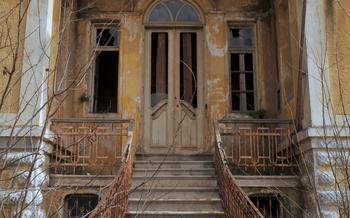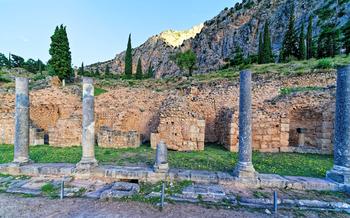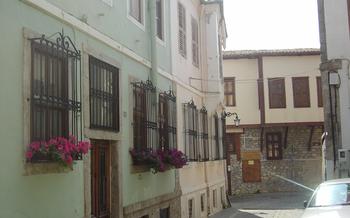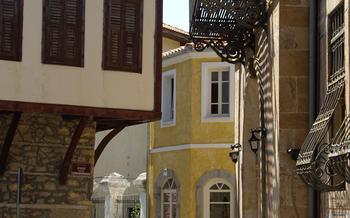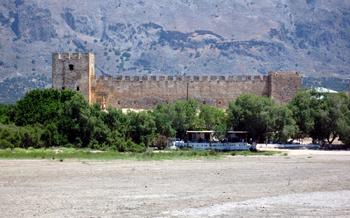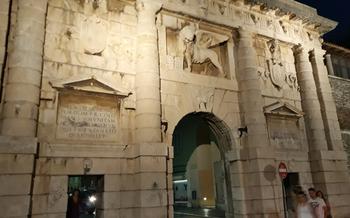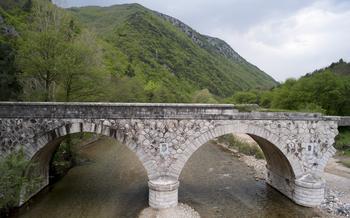
Folklore Museum of Xanthi
- The Folklore Museum of Xanthi: A Journey Through History and Culture
- Exploring the Museum's Collections: A Treasure Trove of Traditions
- Witnessing the Past: The Museum's Unique Artifacts
- Unveiling the History of Xanthi: A City Steeped in Heritage
- Interactive Exhibitions: Engaging Visitors of All Ages
- The Museum's Architectural Charm: A Blend of Styles
- Location and Accessibility: Finding the Museum with Ease
- Hours of Operation and Admission Fees: Planning Your Visit
- Tips for a Rewarding Visit: Making the Most of Your Time
- Photography and Videography: Capturing Memories
- Souvenirs and Gifts: Preserving the Experience
- Accessibility for All: Ensuring an Inclusive Experience
- Educational Programs and Workshops: Engaging the Community
- Research and Publications: Preserving and Sharing Knowledge
The Folklore Museum of Xanthi: A Journey Through History and Culture
Nestled in the heart of Xanthi, Greece, the Folklore Museum stands as a testament to the region's rich cultural heritage. Founded in 1974, the museum has become a beloved institution, offering visitors a unique and immersive experience into the history, traditions, and customs of Xanthi and its surrounding areas.
The Folklore Museum of Xanthi is housed in a beautifully restored neoclassical building, adding to the charm and authenticity of the experience. As you step through its doors, you'll be greeted by a treasure trove of artifacts that paint a vivid picture of Xanthi's past and present. From traditional costumes and textiles to intricate handicrafts, agricultural tools, and rare manuscripts, the museum's collection is a testament to the region's diverse cultural heritage.
Throughout the museum's galleries, you'll learn about Xanthi's role in the Byzantine and Ottoman empires, its contributions to the Greek War of Independence, and its modern-day significance as a vibrant cultural and economic center. Interactive exhibits, multimedia displays, and engaging storytelling bring the region's history to life, making it accessible and enjoyable for visitors of all ages.
Exploring the Museum's Collections: A Treasure Trove of Traditions
The Folklore Museum of Xanthi houses a diverse collection of artifacts that provide a glimpse into the rich cultural heritage of the region. Traditional costumes and textiles, intricately embroidered and adorned with colorful motifs, showcase the region's renowned craftsmanship and artistic traditions. Visitors can admire a variety of woven rugs, tapestries, and kilims, each telling a story of skilled hands and cultural identity.
Handicrafts and pottery, crafted from local materials and techniques passed down through generations, offer insights into the region's traditional livelihoods and artistic expressions. From intricate metalwork and wood carvings to delicate pottery and ceramic ware, these artifacts showcase the creativity and ingenuity of Xanthi's artisans.
Agricultural tools and implements, used in the cultivation of crops and livestock, provide a glimpse into the region's agricultural traditions and the importance of farming in the local economy. Visitors can explore a collection of plows, sickles, threshing machines, and other tools that tell the story of the hard work and dedication of Xanthi's farmers.
Witnessing the Past: The Museum's Unique Artifacts
Among the museum's most captivating exhibits are its rare manuscripts and books. These precious volumes offer a glimpse into the intellectual and literary heritage of Xanthi. From ancient texts to medieval manuscripts, they showcase the region's rich history of scholarship and learning.
Historical photographs and documents provide a visual journey through Xanthi's past. These images capture moments of everyday life, significant events, and the city's transformation over the centuries. Through these photographs, visitors can witness the evolution of Xanthi's urban landscape, its people, and their customs.
Everyday objects, such as tools, utensils, and clothing, offer intimate insights into the lives of Xanthi's residents. These artifacts reveal the ingenuity, resourcefulness, and artistry of the local people. Visitors can learn about traditional crafts, agricultural practices, and domestic life in Xanthi's past.
Finally, the museum houses a collection of traditional musical instruments. These instruments, ranging from stringed lutes to percussion instruments, showcase the region's vibrant musical traditions. Visitors can admire the intricate craftsmanship of these instruments and learn about the role of music in Xanthi's cultural heritage.
Unveiling the History of Xanthi: A City Steeped in Heritage
Xanthi's rich history is intricately woven into the fabric of the Folklore Museum's exhibits. The city, strategically located at the crossroads of trade routes, has witnessed the rise and fall of empires, leaving an indelible mark on its cultural identity. During the Byzantine era, Xanthi flourished as a center of commerce and learning. Its strategic position made it a coveted prize for various empires, including the Bulgarians and the Venetians. In the 15th century, the Ottomans conquered Xanthi, ushering in a period of significant cultural exchange and influence.
Xanthi played a pivotal role in the Greek War of Independence, serving as a refuge for Greek revolutionaries. The city's residents actively participated in the struggle for independence, contributing to the eventual liberation of Greece. In the aftermath of the war, Xanthi emerged as a thriving center of commerce and industry. Its diverse population, comprising Greeks, Turks, Armenians, and Jews, created a vibrant cultural tapestry that shaped the city's unique identity.
Today, Xanthi stands as a testament to its rich and diverse past. The Folklore Museum serves as a living repository of the city's heritage, offering visitors a glimpse into the lives, traditions, and struggles of its people. Through its exhibits and educational programs, the museum plays a crucial role in preserving and promoting Xanthi's cultural legacy, ensuring that its stories continue to inspire and educate future generations.
Interactive Exhibitions: Engaging Visitors of All Ages
The Folklore Museum of Xanthi offers a range of interactive exhibitions that bring history to life and engage visitors of all ages. Multimedia displays showcase the rich cultural heritage of the region, using cutting-edge technology to create an immersive and educational experience. Visitors can explore interactive maps, view historical films, and listen to traditional music, gaining a deeper understanding of Xanthi's past and present.
Hands-on activities for children make learning fun and interactive. Young visitors can dress up in traditional costumes, play traditional games, and participate in craft workshops, experiencing firsthand the rich traditions of the region. Guided tours provide in-depth insights into the museum's collection, with knowledgeable guides sharing stories and anecdotes that bring the exhibits to life.
The museum also organizes workshops and educational programs throughout the year, offering visitors the opportunity to learn new skills and explore different aspects of Xanthi's culture. These programs cover a wide range of topics, from traditional crafts and cooking to music and dance, providing a unique and immersive way to connect with the region's heritage.
The Museum's Architectural Charm: A Blend of Styles
The Folklore Museum of Xanthi stands as a testament to the city's rich cultural heritage, not only through its collection of artifacts but also through its architectural design. The museum's facade is an elegant example of Neoclassical architecture, featuring symmetrical lines, intricate detailing, and a grand entrance. Step inside, and you'll find yourself in a traditional interior courtyard, surrounded by arched walkways and galleries. This courtyard, with its cobblestone flooring and wooden balconies, evokes the atmosphere of a bygone era.
The museum's architectural charm lies in its ability to blend different styles seamlessly. Traditional elements, such as the courtyard and the use of wood and stone, are juxtaposed with modern features like glass panels and steel beams. This harmonious fusion reflects Xanthi's own diverse heritage, where different cultures and influences have intertwined over the centuries.
The Folklore Museum of Xanthi is not just a repository of artifacts; it is a living embodiment of the city's history and identity. Its architectural design serves as a reminder of Xanthi's rich past while embracing the present, making it a symbol of the city's cultural pride.
Location and Accessibility: Finding the Museum with Ease
The Folklore Museum of Xanthi enjoys a central location in the heart of the city, making it easily accessible to visitors. Situated within walking distance of other notable landmarks, such as the Old Town, the Archaeological Museum, and the Municipal Park, the museum is a convenient stop on any cultural itinerary.
Xanthi's public transportation network ensures seamless connectivity to the museum. Several bus lines have stops nearby, and the central bus station is just a short walk away. For those arriving by car, ample parking options are available in the vicinity, ensuring a hassle-free visit.
Hours of Operation and Admission Fees: Planning Your Visit
The Folklore Museum of Xanthi welcomes visitors throughout the week, offering ample opportunities to delve into the region's rich history and traditions. During the summer season, from April to October, the museum's doors are open from 8:00 AM to 8:00 PM, providing extended hours for those seeking a leisurely exploration. In the winter months, from November to March, the museum maintains a slightly shorter schedule, operating from 8:00 AM to 3:00 PM.
Admission fees are designed to make the museum accessible to all, while also supporting its ongoing preservation and educational efforts. Adults can purchase a ticket for 4 euros, while children and students with valid identification can enjoy reduced rates of 2 euros. For groups of ten or more, a special rate of 3 euros per person applies, encouraging collective exploration and learning.
The museum also offers free admission to certain categories of visitors, including children under 6 years old, people with disabilities and their companions, and members of ICOM (International Council of Museums). By providing these concessions, the museum aims to promote inclusivity and ensure that everyone has the opportunity to experience the treasures within its walls.
Plan your visit to coincide with the museum's operating hours to make the most of your time in Xanthi. Whether you prefer the extended hours of the summer season or the more intimate atmosphere of the winter months, the Folklore Museum of Xanthi is ready to welcome you on a journey through history, culture, and tradition.
Tips for a Rewarding Visit: Making the Most of Your Time
To fully appreciate the treasures of the Folklore Museum of Xanthi, it is essential to plan your visit carefully. Set aside ample time to explore the museum's exhibits, allowing yourself to delve into the rich history and culture of the region. Guided tours are highly recommended, as they provide in-depth insights and anecdotes that bring the exhibits to life. Combine your visit to the museum with other attractions in Xanthi, such as the Old Town, the Archaeological Museum, or the Tobacco Museum, to gain a comprehensive understanding of the city's heritage. Take advantage of the educational programs and workshops offered by the museum, which provide hands-on experiences and interactive learning opportunities for visitors of all ages. These programs are a great way to engage with the museum's collections and gain a deeper appreciation for the region's traditions.
Photography and Videography: Capturing Memories
The Folklore Museum of Xanthi welcomes photography and videography within its premises, allowing visitors to capture their experiences and share the beauty of the exhibits with others. To ensure a respectful and enjoyable visit for all, please adhere to the following guidelines:
-
Respectful Photography: When taking photographs or videos, be mindful of other visitors and avoid blocking their views or disturbing their enjoyment of the museum.
-
Privacy of Others: Refrain from taking photographs or videos of other visitors without their consent, especially when they are engaged in activities or exhibits that require privacy.
-
Responsible Flash Photography: The use of flash photography is permitted in the museum, but please be considerate of other visitors and use it responsibly to avoid disrupting their viewing experience.
By following these guidelines, you can capture your memories of the Folklore Museum of Xanthi while ensuring a positive and enjoyable visit for everyone.
Souvenirs and Gifts: Preserving the Experience
The Folklore Museum of Xanthi offers a unique opportunity to preserve your memories and share the richness of the region's culture with friends and family back home. The museum shop is a treasure trove of souvenirs, traditional handicrafts, and local products that embody the spirit of Xanthi.
Browse through an array of handcrafted items, each carrying a story of local artisanship. From intricately embroidered textiles and pottery to hand-painted ceramics and jewelry, you're sure to find something that captures your heart.
The museum shop also offers a selection of books and publications that delve deeper into Xanthi's history, culture, and traditions. These books are a valuable resource for those seeking to learn more about this fascinating region.
By purchasing souvenirs from the museum shop, you not only take home a tangible piece of Xanthi's heritage but also support the museum's ongoing efforts to preserve and promote local culture. Your purchase contributes to the museum's ability to continue its vital work, ensuring that future generations can continue to appreciate and learn from the region's rich traditions.
Accessibility for All: Ensuring an Inclusive Experience
The Folklore Museum of Xanthi is dedicated to providing an inclusive experience for visitors of all abilities. The museum is wheelchair accessible throughout, with ramps and elevators ensuring easy movement between floors. Additionally, audio guides and signage are available in multiple languages to accommodate visitors from diverse backgrounds. The staff is trained to assist visitors with disabilities, providing information and guidance to enhance their visit. By creating an inclusive environment, the museum ensures that everyone can explore and appreciate the rich cultural heritage of Xanthi.
Educational Programs and Workshops: Engaging the Community
The Folklore Museum of Xanthi extends its reach beyond its walls by offering a range of educational programs and workshops, fostering a sense of community engagement and cultural preservation. These initiatives cater to diverse audiences, including school groups, community organizations, and individuals seeking to delve deeper into Xanthi's rich heritage.
Schoolchildren are invited to embark on interactive learning journeys through guided tours and workshops tailored to their curriculum. These programs bring history and culture to life, allowing students to engage with traditional crafts, explore the significance of local customs, and develop a deeper appreciation for their roots.
The museum also hosts workshops on traditional crafts, providing participants with hands-on experience in pottery, weaving, embroidery, and other skills that have been passed down through generations. These workshops offer a unique opportunity to learn from master artisans, preserving and promoting traditional techniques while fostering creativity and cultural exchange.
Lectures and presentations by experts in various fields, such as history, archaeology, and folklore, are regularly organized at the museum. These events provide a platform for the dissemination of knowledge and encourage dialogue and discussion on topics related to Xanthi's heritage and cultural identity.
Through these educational programs and workshops, the Folklore Museum of Xanthi plays a vital role in promoting cultural education, fostering a sense of community pride, and ensuring that the traditions and knowledge of the past continue to thrive in the present and future.
Research and Publications: Preserving and Sharing Knowledge
The Folklore Museum of Xanthi is not merely a repository of artifacts; it is a vibrant center of research and knowledge production. The museum's dedicated team of researchers and historians is committed to preserving and sharing the rich cultural heritage of Xanthi and the surrounding region. Through meticulous research projects and documentation efforts, they delve into the past, unearthing forgotten stories and traditions.
Their findings are disseminated through publications in academic journals, books, and exhibition catalogs. These scholarly works contribute to a deeper understanding of Xanthi's history, its unique cultural identity, and its place within the broader tapestry of Greek and Balkan heritage. By sharing their knowledge with the wider community, the museum plays a vital role in promoting cultural education and preservation.
